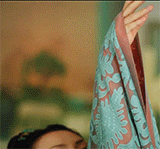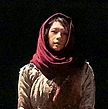The memorable Ziyi Zhang
Chinese actress Ziyi Zhang has become one of the most recognisable Asian actresses in the Western world. She was nominated for the leading actress Bafta for her role in Memoirs of a Geisha, but lost out to Reese Witherspoon.
Twenty-seven-year-old Zhang is on the verge of winning a number of major acting awards in the United States but until recently could not speak a word of English.
The protagonist in Rob Marshall’s film version of best-selling novel Memoirs of a Geisha, she was introduced to audiences outside Asia thanks to the global success of Ang Lee’s Crouching Tiger Hidden Dragon.
In that film, the Chinese actress’s voice was dubbed for English-speaking audiences while a year later she was seen speaking English in Hollywood action adventure Rush Hour 2.
But even then she was not an English speaker and had her part translated for her phonetically by co-star Jackie Chan.
In a recent interview she said: “Jackie is a wonderful man and a very big star, but I was sort of lost, you know? Jackie had to translate everything the director said to me.”
Her spur to speak English was being cast in the title role of Geisha. Zhang admitted she had to “finally get serious” with her language lessons if she was going to carry the role successfully.
She trained as both a dancer and actress, entering the Beijing Dance Academy at the age of 11, and at 15 she entered China’s prestigious Central Academy of Drama.
Her ambitions were to be a teacher of young children but aged 19 she was offered her first role in renowned director Zhang Yimou’s The Road Home, which won the Silver Bear award in the 2000 Berlin Film Festival.
Chinese actress Ziyi Zhang has become one of the most recognisable Asian actresses in the Western world.
She was nominated for the leading actress Bafta for her role in Memoirs of a Geisha, but lost out to Reese Witherspoon.
Twenty-seven-year-old Zhang is on the verge of winning a number of major acting awards in the United States but until recently could not speak a word of English.
The protagonist in Rob Marshall’s film version of best-selling novel Memoirs of a Geisha, she was introduced to audiences outside Asia thanks to the global success of Ang Lee’s Crouching Tiger Hidden Dragon.
In that film, the Chinese actress’s voice was dubbed for English-speaking audiences while a year later she was seen speaking English in Hollywood action adventure Rush Hour 2.
But even then she was not an English speaker and had her part translated for her phonetically by co-star Jackie Chan.
In a recent interview she said: “Jackie is a wonderful man and a very big star, but I was sort of lost, you know? Jackie had to translate everything the director said to me.”
Her spur to speak English was being cast in the title role of Geisha. Zhang admitted she had to “finally get serious” with her language lessons if she was going to carry the role successfully.
She trained as both a dancer and actress, entering the Beijing Dance Academy at the age of 11, and at 15 she entered China’s prestigious Central Academy of Drama.
Her ambitions were to be a teacher of young children but aged 19 she was offered her first role in renowned director Zhang Yimou’s The Road Home, which won the Silver Bear award in the 2000 Berlin Film Festival.
Her dance training helped her enormously as she filmed the balletic fight scenes for Lee’s Crouching Tiger, which won four Oscars and a nomination for best director.
Her performance in the film also earned her a nomination from Bafta for a best supporting actress award.
Last year she was made a member of the US Academy of Motion Picture Arts and Sciences, allowing her to vote in the Oscars.
Time magazine last year called her “China’s gift to Hollywood”.
Since Crouching Tiger Zhang has mixed her roles between US productions and Chinese films such as Geisha and House of Flying Daggers.
She is currently filming a chinese production, The Night Banquet, a loose reworking of Hamlet.
She told the Detroit Free Press newspaper: “Everyone tells me, ‘Oh Ziyi, you are so lucky to have worked with all these great filmmakers while you are so young,’ and that is true, I know.
“But sometimes, I also think, well, they also want to work with me, so maybe I have something to offer they like.”
 Welcome to Zhang Ziyi Infos, your best source for the Chinese actress since 2007. Zhang Ziyi is a famous actress known for her roles in Crouching Tiger, Hidden Dragon, Memoirs of a Geisha, The Grandmaster and so many other great films. Zhang Ziyi recently directed the short film Poem in the anthology film My Country, My Parents. Read her full biography
Welcome to Zhang Ziyi Infos, your best source for the Chinese actress since 2007. Zhang Ziyi is a famous actress known for her roles in Crouching Tiger, Hidden Dragon, Memoirs of a Geisha, The Grandmaster and so many other great films. Zhang Ziyi recently directed the short film Poem in the anthology film My Country, My Parents. Read her full biography 






















